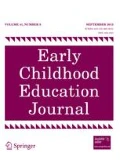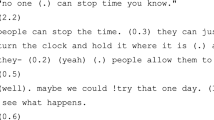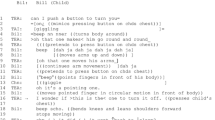Abstract
Research shows that conversations and daily interaction among teachers and children is crucial for their development. Observing children and interpreting their thinking processes is a significant factor in intentionally planning curriculum that emerges from children’s thinking, assists them in making connections, and extends their learning. This article presents findings of a single case design study investigating the effects of the observation and interpretation processes in a Cycle of Inquiry System (COI) (Broderick and Hong in Early Childh Res Pract 13:1–14, 2011) intervention on preschool teachers’ productive conversations with children. The intervention for each teacher consisted of pre and post interviews, a 1-day COI training, use of COI observation and interpretation forms, and coaching meetings with the researcher. The participants were 4 preschool teachers in Northeast Tennessee. Teachers were videotaped in their classrooms working with children during the free play time and coded for productive and non-productive conversation strategies for determining the baseline and changes during the intervention. All the teachers show an increase in productive conversation strategies to differing degrees. The non-overlapping pairs analysis for all participants is represented by a large value. The findings indicate the benefit of training teachers to observe and interpret the meaning of children’s conversations to intentionally plan for productive conversations that impact learning.






Similar content being viewed by others
References
Blair, C. (2002). School readiness: Integrating cognition and emotion in a neurobiological conceptualization of child functioning at school entry. American Psychologist, 57, 111–127. https://doi.org/10.1037/0003-066X.57.2.111
Bickart, T. S., Jablon, J. R., Dodge, D. T., & Kohn, E. (2004). Building the primary classroom: A complete guide to teaching and learning. Teaching Strategies.
Biermeier, M. A. (2015). Inspired by Reggio Emilia: Emergent curriculum in relationship-driven learning environments. Young Children, 70(5), 72–79.
Broderick, J. T., & Hong, S. B. (2011). Introducing the cycle of inquiry system: A reflective inquiry practice for early childhood teacher development. Early Childhood Research and Practice, 13(2), 1–14.
Broderick, J. T. & Hong, S. B (2020). From children’s interests to children’s thinking: Using a cycle of inquiry to plan curriculum. Washington, DC: NAEYC
Castle, K. (2009). What do early professionals do? Dimensions of Early Childhood, 37(3), 4–10.
Chen, J. J., & Kim, S. D. (2014). The quality of teachers’ interactive conversations with preschool children from low-income from low-income families during small-group and large-group activities. Early Years: An International Research Journal. https://doi.org/10.1080/09575146.2014.912203
Chu, C. (2012). Mentoring for Leadership. In K. Sanga & J. Kidman (Eds.), Harvesting ideas: New generation perspectives (115–133). USP, Suva: USP Press.
Creswell, J. W. (2017). Qualitative inquiry and research design: Choosing among five traditions (4th ed.). SAGE Publications, Inc
Dangel, J. R., & Hooper, S. (2010). Researching pedagogy in a professional development school. School-University Partnership, 4(1), 88–100.
Denton, P. (2015). The power of our words: Teacher language that helps children learn (2nd ed.). Northeast Foundation for Children.
DeVries, R., Zan, B., Hildebrandt, C., Edminston, R., & Sales, C. (2002). Developing constructivist early childhood curriculum: Practical principles and activities. Teacher College Press.
Downer, J. T., Locasale-Crouch, J., Hamre, B., & Pianta, R. (2009). Teacher characteristics associated with responsiveness and exposure to consultation and on-line professional development resources. Early Education and Development, 20(3), 431–455. https://doi.org/10.1080/10409280802688626
Dunst, C. J., & Trivette, C. M. (2009). Let’s be PALS: An evidence-based approach to professional development. Infants & Young Children, 22(3), 164–176. https://doi.org/10.1097/IYC.0b013e3181abe169
Edwards, C. P., Gandini, L., & Forman, G. E. (Eds.). (1998). The hundred languages of children: The Reggio Emilia approach—Advanced reflections (2nd ed.). Albex.
Engel, S. (2011). Children’s need to know: Curiosity in schools. Harvard Educational Review, 81(4), 625–645.
Epstein, A.(1993). Training for quality: Improving early childhood programs through systematic in service training. Monographs of the High/Scope educational research foundation, number nine. High/Scope Educational Foundation
Forman, G., & Hall, E. (2005). Wondering with children: The importance of observation in early education. Early Childhood Research and Practice, 7(2), 1–11.
Gandini, L. (2012). History, ideas and basic principles: An interview with Loris Malaguzzi. In C. P. Edwards, L. Gandini, & G. E. Foreman (Eds.), The hundred languages of children: The Reggio Emilia experience in transformation (3rd ed., pp. 27–71). Praeger.
Gallagher, P. A., Abbott-Shim, M., & VandeWiele, L. (2011). An evaluation of the individualized learning intervention: A mentoring program for early childhood teachers. NHSA Dialog, 14(2), 57–74. https://doi.org/10.1080/15240754.2011.560973
Gleave, J. (2009). Children’s time to play: A literature review. Playday.
Hallgren, K. A. (2012). Computing inter-rater reliability for observational data: An overview and tutorial. Tutorials in Quantitative Methods for Psychology, 8(1), 23.
Harris, P. L. (2005). Conversation, pretense, and theory of Mind. In J. W. Astington & J. A. Baird (Eds.), Why language matters for theory of mind (pp. 70–83). Oxford University Press.
Hoff, E., & Naigles, L. (2002). How children use input to acquire a lexicon. Child Development, 73(2), 418–433.
Kazdinm, A. (2021). Single case experimental designs: Characteristics, changes, and challenges. Journal of the Experimental Analysis for Behavior, 115(1), 56–85.
Martalock, P. L. (2012). “What is a Wheel?” The image of the child: Traditional project approach, and Reggio Emilia Perspectives. Dimensions of Early Childhood, 40(3), 3–12.
Montessori, M. (1995). The absorbent mind. Holt Paperbacks.
Morgan, D., & Morgan, R. (2008). Single-case research methods for behavioral and health sciences. SAGE Publications.
Neitzel, J. (2018). What measures of program quality tell us about the importance of executive function: Implication for teacher education and preparation.
Nelson, M. C., Cordray, D. S., Hulleman, C. S., Darrow, C. L., & Sommer, E. C. (2012). A procedure for assessing intervention fidelity in experiments testing educational and behavioral intervention. Journal of Behavioral Health Services and Research, 39(4), 374–396.
Parker, R., & Vannest, K. (2009). An improved effect size for single case-research: Nonoverlap of all pairs. Behavior Therapy, 40, 357–367.
Peterson, J. B., & Flanders, J. L. (2005). Play and the regulation of aggression. In R. E. Tremblay, W. W. Hartup, & J. Archer (Eds.), Developmental origins of aggression (pp. 133–157). The Guilford Press.
Pianta, R. C., LaParo, K. M., & Hamre, B. K. (2008). Classroom assessment scoring system: CLASS pre-k; manual. Brookes.
Rengel, K. (2014). Preschool teachers’ attitudes towards play. Croatian Journal of Education, 16, 113–125.
Seguin, R., & Zelazo, P. D. (2005). Executive function in early physical aggression. In R. Trembly, W. Hartup, & I. Archer (Eds.), Developmental origins of aggression (pp. 307–329). Guilford Press.
Singer, e., Nederend, M., Penninx, L., Tajik, M., & Boom, J. (2013). The teacher’s role in supporting young children’s level of play engagement. Early Child Development and Care. https://doi.org/10.1080/03004430.2013.862530
Teachstone. (2011). Pre-K CLASS Dimensions Guide. Charlottesville (v 2.1). Teachstone Training, LLC.
Test, J. E., Cunningham, D. D., & Lee, A. C. (2010). Talking with young children: How teachers encourage learning. Dimensions of Early Childhood, 38(3), 3–14.
Thibodeau, R., Gilpin, A., Brown, M., & Meyer, B. (2016). The effects of fantastical pretend play on the development of executive functions: An intervention study. Journal of Experimental Child Psychology, 145, 120–138.
Thornton, K. (2015). The impact of mentoring on leadership capacity and professional learning. In Murphy, C., Thornton, K. (Eds), Mentoring in Early Childhood Education.
Trawick-Smith, J. & Dziurgot, T. (2010). Untangling teacher-child interactions: Do teacher education and experience influence “good-fit” responses to children’s play?
UNICEF. (2018). Learning through play: Strengthening learning through play in early childhood educations programs. UNICEF.
Van Hoorn, J. L., Scales, B., Nourot, P. M., & Alward, K. R. (2015). Play at the center of the curriculum (6th ed.). Pearson.
Vartuli, S., Bolz, C., Wilson, C. (2014). A learning combination: Coaching with CLASS and the project approach. Early Childhood Research & Practice, 16 (1). https://files.eric.ed.gov/fulltext/EJ1045226.pdf
Vitiello, V. E., Bassok, D., Hamre, B. K., Player, D., & Williford, A. P. (2018). Measuring the quality of teacher-child interactions at scale: Comparing research-based and state observation approaches. Early Childhood Research Quarterly, 44, 161–169.
Walsh, J. A., & Sattes, B. D. (2017). Quality questioning: Research-based practice to engage every learner (2nd ed.). Corwin.
What Works Clearinghouse. (2010).
Wohlford, G. (2018). The effects of an observation and interpretation intervention (COI/PALS) on teachers’ productive and nonproductive conversations with preschool children (Doctoral Dissertation). Retrieved from ProQuest.
Wood, D., Bruner, J. S., & Ross, G. (1976). The role of tutoring in problem solving. Journal of Child Psychology and Psychiatry, and Allied Disciplines, 17(2), 89–100.
Zelazo, P., Frye, D., & Rapus, T. (1996). An age-related dissociation between knowing rules and using them. Cognitive Development, 11(1), 37–63.
Funding
Funding was supported by East Tennessee State University (Grant No. 18-013M).
Author information
Authors and Affiliations
Corresponding author
Additional information
Publisher's Note
Springer Nature remains neutral with regard to jurisdictional claims in published maps and institutional affiliations.
Rights and permissions
About this article
Cite this article
Broderick, J.T., Sareh, N. & Aggrey, P.MB. Teaching Preschool Teachers to Converse Productively with Children: A Single Case Design. Early Childhood Educ J 51, 165–178 (2023). https://doi.org/10.1007/s10643-021-01284-0
Accepted:
Published:
Issue Date:
DOI: https://doi.org/10.1007/s10643-021-01284-0




